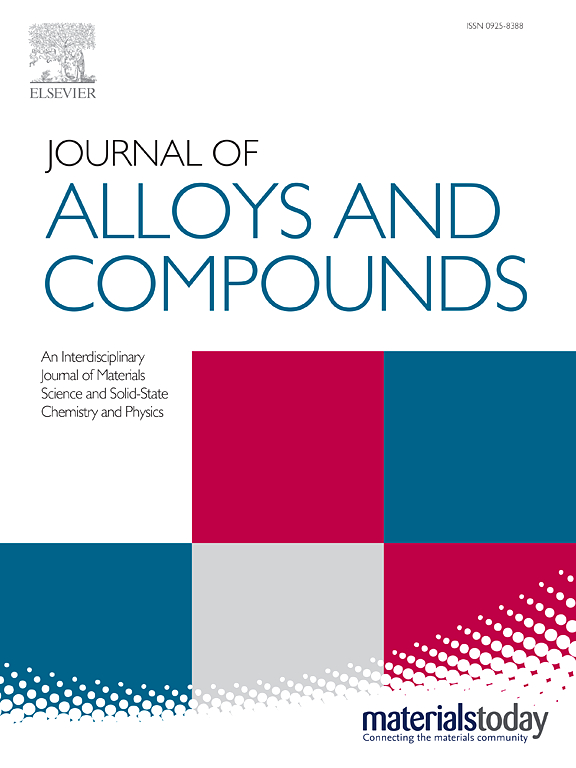Self-degradable magnesium alloy-based temporary plugging ball for fracturing in deep reservoir
IF 6.3
2区 材料科学
Q2 CHEMISTRY, PHYSICAL
引用次数: 0
Abstract
With the exploration and development of deep-buried reservoirs in China, the existing techniques are struggling to meet the demand for deep fracturing. It is of great significance to develop a new type of high-temperature and high-salinity resistant temporary plugging material for efficient transformation of the reservoir, enhancing conductivity, and increasing the cumulative oil and gas production. Metal-based temporary plugging balls (TPBs) generally have good temperature and pressure resistance, but at the same time face the challenge of long degradation time. In this research, a kind of fast degrading temporary plugging ball (FD-TPB) was prepared using the stir casting method, which can maintain high-strength mechanical properties while forming low corrosion potential and exhibiting excellent degradation performance. The experimental results show that the density of FD-TPB is 1.75 g·cm–3, and the settling velocity in fracturing fluid is 7.01 cm·min–1. Vickers hardness is 46.38 HV at room temperature, compressive strength could reach 180 MPa at 210℃. The simulated plugging and diverting fracturing experiments show that it can effectively carry 49.17 MPa pressure under the temperature of 180℃, complete the operation and successfully create fractures in the reformed core. FD-TPB has a self-corrosion potential of –1.70 V and a self-corrosion current density of 3.15 × 10⁻5 A·cm⁻2. At reservoir conditions of 210℃ and 22 × 104 mg·L–1 salinity formation water, the weight loss of FD-TPB can reach 90.1 % within 100 h. The mechanism of Fe nanoparticles enhancing degradation was proposed based on the morphological changes during degradation and microstructure of the materials. The successful development of FD-TPB provides a new technical solution for the efficient exploitation of deep oil and gas resources, potentially enhancing reservoir stimulation effects, and increasing cumulative oil and gas production.
深层储层压裂用自降解镁合金暂堵球
随着中国深部储层的勘探开发,现有的压裂技术难以满足深层压裂的需求。开发新型耐高温、耐高矿化度暂堵材料,对有效改造储层、增强导流能力、提高累计油气产量具有重要意义。金属基临时封堵球(TPBs)通常具有良好的耐温耐压性,但同时也面临降解时间长的挑战。本研究采用搅拌铸造法制备了一种快速降解的暂堵球(FD-TPB),该球在保持高强度力学性能的同时形成低腐蚀电位,具有优异的降解性能。实验结果表明,FD-TPB密度为1.75 g·cm - 3,在压裂液中的沉降速度为7.01 cm·min-1。室温时维氏硬度为46.38 HV, 210℃时抗压强度可达180 MPa。模拟堵转压裂实验表明,在180℃的温度下,堵转压裂能有效承受49.17 MPa的压力,完成改造岩心的作业并成功造缝。FD-TPB的自腐蚀电位为-1.70 V,自腐蚀电流密度为3.15×10·cm⁻2。在210℃、22×104 mg·L-1矿化度地层水条件下,FD-TPB在100 h内的失重率可达90.1%。基于材料在降解过程中的形态变化和微观结构,提出了Fe纳米颗粒增强降解的机理。FD-TPB的成功开发,为高效开发深部油气资源、提高储层增产效果、提高累计油气产量提供了新的技术解决方案。
本文章由计算机程序翻译,如有差异,请以英文原文为准。
求助全文
约1分钟内获得全文
求助全文
来源期刊

Journal of Alloys and Compounds
工程技术-材料科学:综合
CiteScore
11.10
自引率
14.50%
发文量
5146
审稿时长
67 days
期刊介绍:
The Journal of Alloys and Compounds is intended to serve as an international medium for the publication of work on solid materials comprising compounds as well as alloys. Its great strength lies in the diversity of discipline which it encompasses, drawing together results from materials science, solid-state chemistry and physics.
 求助内容:
求助内容: 应助结果提醒方式:
应助结果提醒方式:


